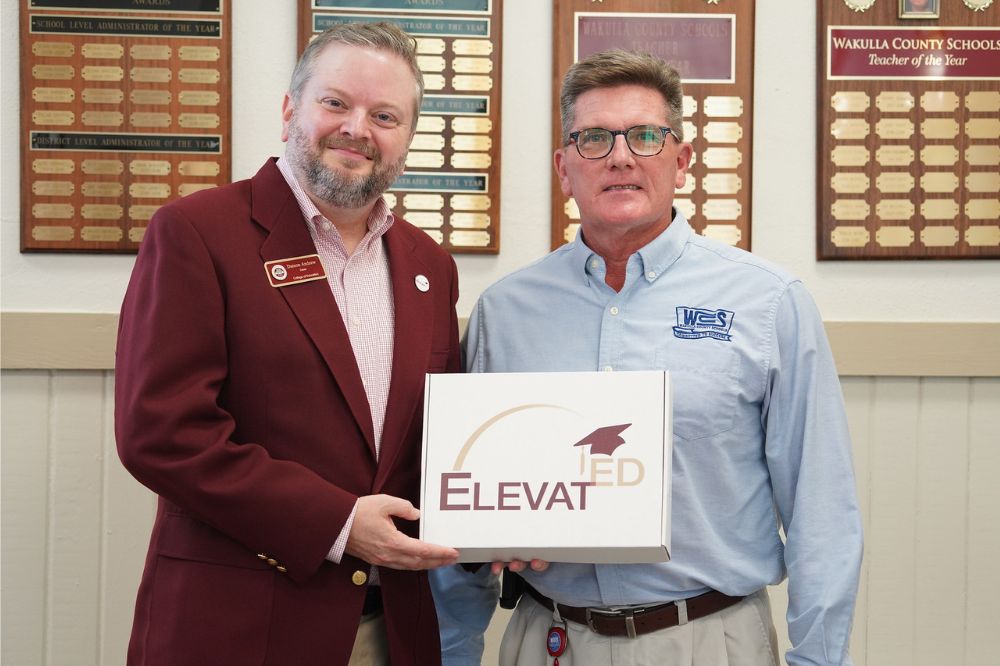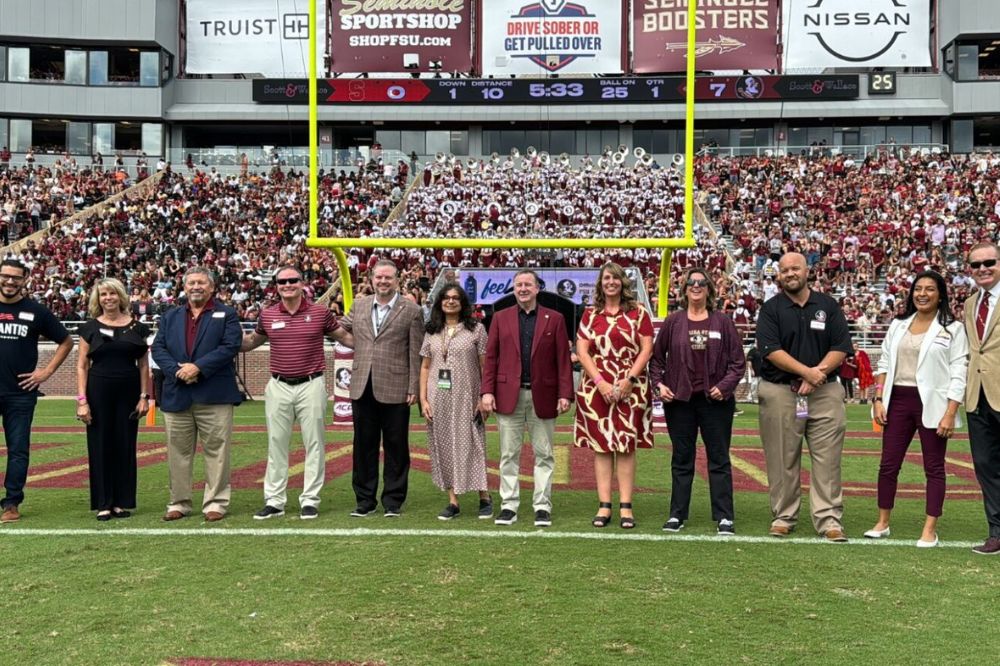
Florida, renowned for its sunshine and tourist attractions, is facing a pressing issue that is casting a shadow over its educational system—a severe teacher shortage. But the storm clouds of this crisis extend far beyond the state. According to the National Center for Education Statistics, 79% of public school districts surveyed reported that they had difficulty hiring teachers, while 80% reported that they had difficulty hiring at least one staff position for the 2023-24 school year (2023).
The shortage facing Florida and the rest of the nation is historic, but the College of Education, Health, and Human Sciences at Florida State University is doing its part in addressing the shortage and changing the conversation surrounding education.
The Scope of the Problem
The magnitude of the teacher shortage in Florida is alarming. According to the Florida Department of Education, there was a statewide shortage of 4,776 educators for the 2023-24 school year. This deficit affects a wide range of subjects, with critical shortages in areas like mathematics, science, and special education (Florida Department of Education, 2023). Furthermore, teacher shortages can disproportionately impact low-income and minority students, perpetuating educational inequalities.
Several factors contribute to the teacher shortage in Florida, including teacher salary, regional competition, and fallout from the COVID-19 pandemic. Florida ranked 48th among the 50 states in pay (National Education Association), and further compounding this issue is the fact that the neighboring states of Georgia and Alabama rank considerably better, with Alabama ranking 33 and Georgia ranking 21 (National Education Association, n.d.). Trinidad (2021) found that 17% of teachers were considering leaving the profession due to factors related to COVID-19, namely burnout and increased stress.
The ramifications of the teacher shortage in Florida are profound. Higher student-to-teacher ratios mean less individualized attention, making it difficult to address the diverse learning needs of students. Lower teacher quality can lead to reduced student performance, impacting academic achievement and long-term prospects for Florida's youth. Moreover, the shortage exacerbates disparities in education, with underprivileged communities being hit the hardest. Without highly qualified and motivated teachers, it becomes increasingly challenging to close the achievement gap.
A Change in the Weather
While these dark clouds seem like they have no intention of moving, something must be done to weather the storm. Florida State University’s College of Education, Health, and Human Sciences launched Project ElevatED to do its part in supporting education professionals and the education pipeline. This project reifies the Third Mission of universities by engaging with the community in new ways and creating a lasting influence on the regional ecosystem.
Project ElevatED centers around three ideas: inspiring young people to consider education professions, recruiting and training prospective students for careers in schools, and then creating opportunities for professional development and recognition programs to help retain current teachers.
To accomplish the first goal, FSU made it a point to engage with students earlier than ever before. According to data reported by the Florida Council of 100, only 3% of graduating high school seniors who took the ACT test in Florida report they would consider a career in Pre-K-12 education, a figure that has been declining for the past 10 years. We realized that in order to change the desirability of the profession, we would need to reach out to students who are still in grade school.
To that end, we created care packages containing information for current teachers on our professional development programs, but we also included a stuffed Cimarron mascot alongside some other goodies for teachers to display in their classroom. The hope is that students would ask about the Cimarron, and the teachers would share their enthusiasm for teaching as a career as well as their educational experiences at our institution. The care packages turned out to provide a fortuitous boost to teacher morale in an otherwise dark time, as we sent these out during the COVID-19 pandemic. Teachers to this day still send us messages about how much our care packages meant to them in such a stressful time.

Dean Damon Andrew delivering care packages to a school in Wakulla County, Florida.
However, we also wanted to present a grand gesture of teacher recognition. Working with our partners at the Florida Department of Education (FLDOE), the Florida Association of District School Superintendents (FADSS), and FSU Athletics, we created a recognition opportunity that takes place during inarguably the most visible social event in the area: an FSU football game. To put it in perspective, the stadium is the 49th largest in the world and has a capacity of nearly 80,000 people.
This intersection between sports, education, and the public made it the perfect venue to recognize exceptional education professionals, and with the collaboration of FLDOE and FADSS, we recognized the best of Florida educators: the state’s teacher of the year, principal of the year, assistant principal of the year, superintendent of the year, and school-related employee of the year. University and college leadership join these individuals on the field, alongside representatives from FADSS and FLDOE. Finally, we also recognize and thank all the teachers and education professionals in attendance at the game and thank them for their service in making our society stronger. An example of the ceremony can be found here.

From the 2023 FSU vs Syracuse football game, where Florida educators of the year were recognized on the field, alongside Dean Damon Andrew, FSU President Richard McCullough, and First Lady Jai Vartikar
Furthermore, we also wanted to be sure that key elements of Project ElevatED could be replicated and extended. A major objective of Project ElevatED is to inspire every major college athletic department across the nation to dedicate an annual event to honor P-12 education professionals. In line with this vision, we aspire to see every college and university in Florida actively participate in this initiative. Our collective efforts aim to increase awareness of the invaluable role educators play in our society and underscore our unwavering commitment to education.
To date, seven schools have joined as affiliates and have either started similar recruitment, recognition, and retention programs or are in progress, with an additional six universities currently starting their own version of Project ElevatED. To help facilitate these partnerships, FSU created a toolkit that provides everything from press release templates and scripts to help pitch university leadership to project timelines and scripts for creating similar recognition events during a sporting event.
Development and Support
Finally, the FSU College of Education, Health, and Human Sciences also expanded its education programs and created professional development opportunities as part of Project ElevatED. For our education programs, we created or expanded programs in innovative ways to help meet the demand of prospective students and the Florida workforce.
For instance, an area that is often overlooked is athletic coaching. Coaches are often self-taught or must learn from experience, and few professional opportunities for education exist for coaches. FSU saw an opportunity to approach coach preparation in a different way by teaching research-based methodologies, and as part of Project ElevatED, we launched an online master’s in athletic coaching as well as a graduate certificate through the innovative Interdisciplinary Center for Athletic Coaching (also known as FSU COACH).
School counselors are also often left out of conversations regarding school personnel shortages. Campus Safety (2023) found that Florida is only meeting 21% of its mental healthcare needs, with a ratio of counselors to students at 434:1. To help address this shortage, FSU launched a combined online master’s and specialist program in school counseling. The online format allows students from across the state to receive an exceptional education no matter where they reside.
Additionally, we launched professional development programs to both provide additional resources to educators and to strengthen our relationship with education professionals across the state. FSU launched or expanded three professional development opportunities, including the Adult & Community Education (ACE) Summer Institute. Not only did this program provide additional opportunities for individuals with disabilities in our community, but it also allowed our students to gain hands-on experience working with individuals with learning disabilities. ACE is considered a model institution, and faculty and stakeholders are working to help replicate this program in other communities as well.
Conclusion
The teacher shortage in Florida is not merely an issue of numbers; it is a challenge to the very foundation of the state's educational system. The consequences of this shortage are felt most acutely by the students, particularly those in disadvantaged communities. Addressing this crisis requires a concerted effort from policymakers, educators, and community partners, like FSU. While we do not write the policy or determine the education budget, we can do our part in this equation by building a climate of positivity and appreciation around the education professions. With our efforts and the work of others, Florida can begin to alleviate its teacher shortage and provide a brighter future for its students.
National Center for Education Statistics. (n.d.). School Pulse Panel: Responses to the pandemic and efforts toward recovery. NCES. https://nces.ed.gov/surveys/spp/results.asp
Florida Department of Education. (2023). Identification of High Demand Teacher Needs for 2023-24 [PDF]. https://www.fldoe.org/core/fileparse.php/20562/urlt/16-2.pdf
National Education Association. (n.d.). Educator Pay Data. NEA.org. https://www.nea.org/resource-library/educator-pay-and-student-spending-how-does-your-state-rank/teacher
Trinidad, J.E. (2021). Teacher satisfaction and burnout during COVID-19: what organizational factors help? International Journal of Leadership in Education. https://doi.org/10.1080/13603124.2021.2006795
Campus Safety. (2023, July 13). School Counselor Shortages by State and Its Impact on Students. https://www.campussafetymagazine.com/mental-health/school-counselor-shortages-by-state-impact-on-students/


.
Image Credits: Josh Duke and Damon Andrew